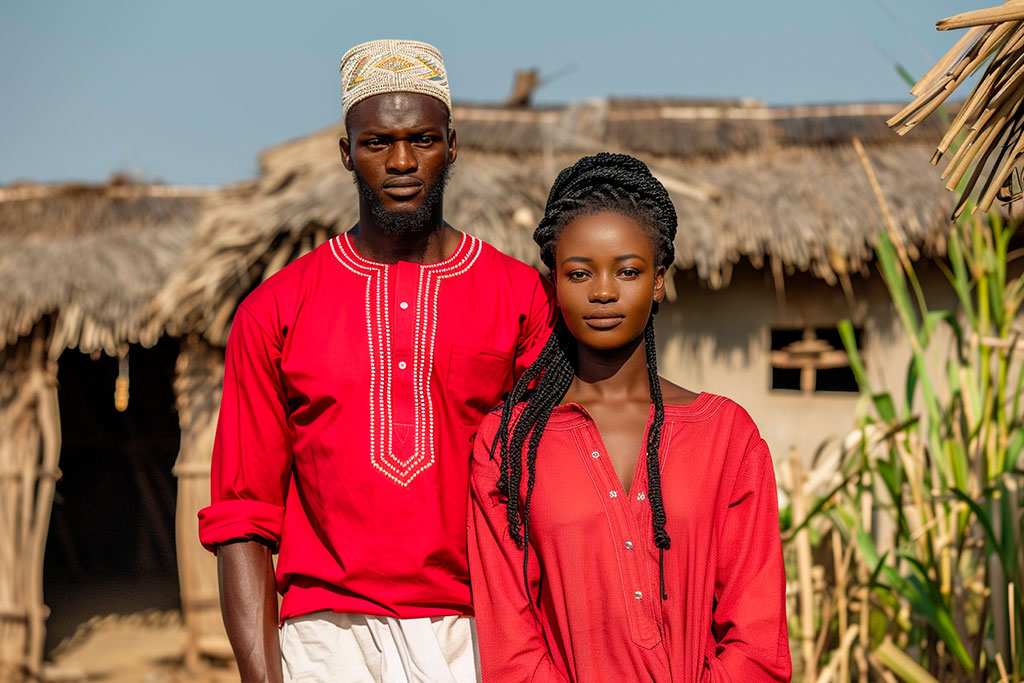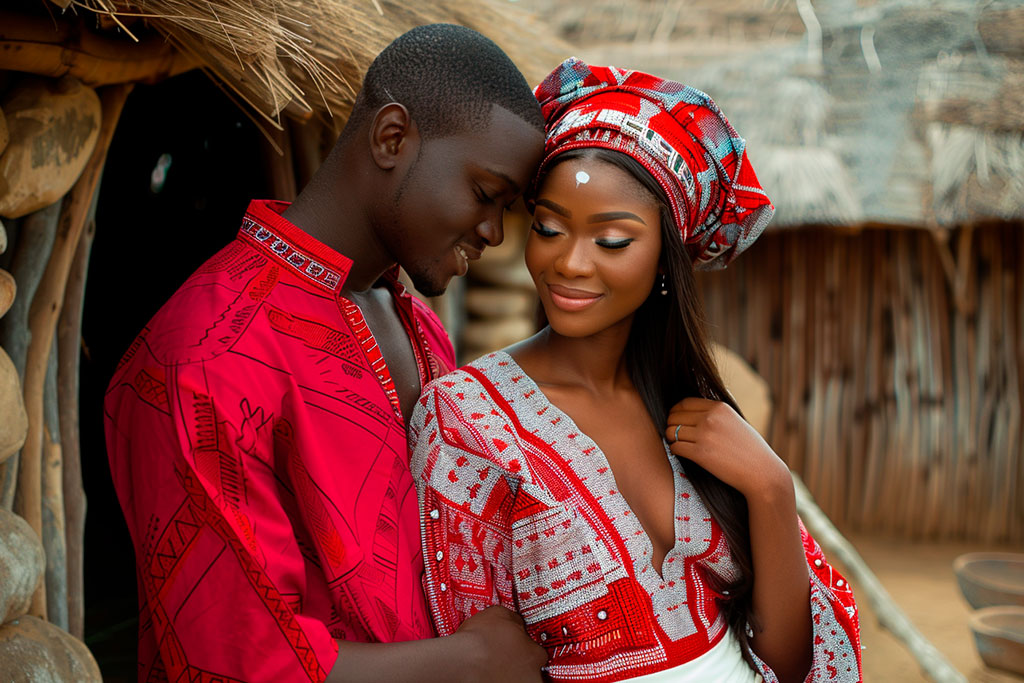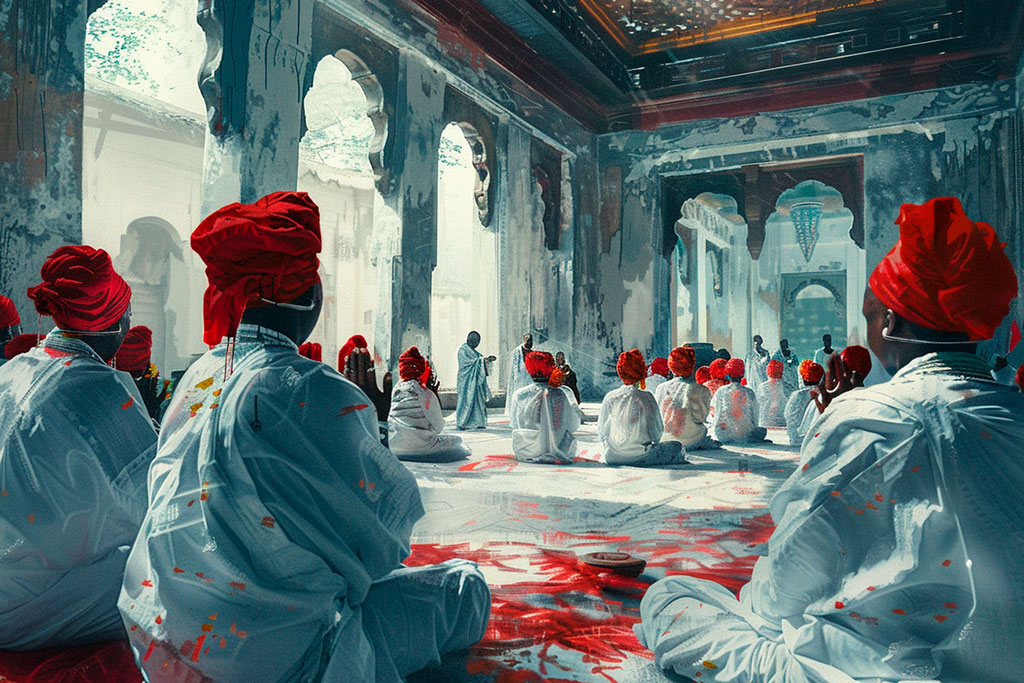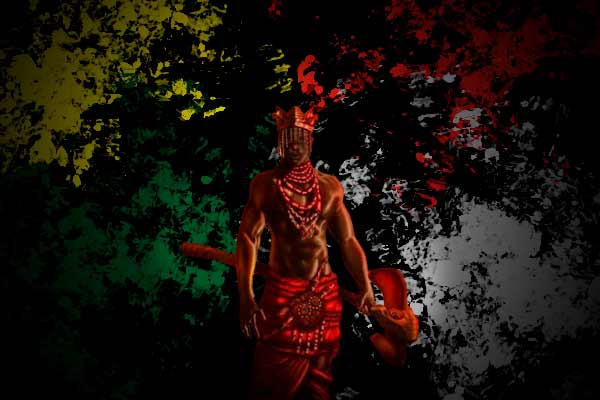What are the Children of Shango like? Personality, Love and Taboos

Shangó, Orisha of thunder and Fire, permeates the Yoruba religion and Santeria with his charisma and passion. His influence extends beyond rituals and festivities, deeply marking his spiritual children. The sons of Shango Not only do they inherit their strength and vitality, but they also face unique challenges on their spiritual path. Through their lives, the characteristics, love, challenges and prohibitions that define them are revealed. Oni Shango, offering a glimpse into how they live in harmony with the legacy of their powerful protector.
General Characteristics of the Children of Shangó
Shangó, recognized for his dominant influence on the personality of his devotees, endows his children, the Oni Shangó, with distinctive attributes and defects. His presence is manifested in their lives, marking both their virtues and their challenges.
Personality and Qualities
The children of Shangó share a series of traits that reflect the vibrant and powerful essence of this Orisha:
- Financial: They stand out in their ability to solve problems and are adept in religious practices, showing exceptional dedication to the spiritual.
- Energy and Liveliness: They have a contagious energy, with a disposition that is always happy and full of life.
- Collaboration: They are extremely collaborative individuals, willing to offer help and work as a team.
- Carisma: Men in particular are very charismatic, able to attract and maintain the attention of those around them with great ease.
- Artistic talent: Many are good dancers and versed in the arts, excelling in activities that require expression and rhythm.
Defects
Although Shango's children are admired for their many qualities, they also face specific challenges associated with their temperament and socialization:
- Scandalous and Praising: Some may tend to be loud and prone to talk excessively about their achievements.
- Fame of Womanizers: Especially among men, there is a tendency towards promiscuity, often seen as womanizers due to their ease of entering into relationships.
- Social Withdrawal (in women): Women tend to be more withdrawn, which can limit their ability to interact and develop socially.
- Stubbornness: Both men and women can show a strong character and be quite stubborn.
- Unfortunate in Love (myth among women): There is a myth that suggests that Shango's daughters may have less fortune in matters of the heart.
Shangó's influence on his children is indisputable, shaping personalities that are both vibrant and complex. The Oni Shangó are beings of light and shadow, whose lives are impregnated with the strength and character of their Orisha. Despite the challenges and warnings of the Odu of Ifá Obara Okana about the importance of obedience to Shangó, his children continue to be central figures in religious practice, celebrating life with energy and passion.
Children of Shango in Love

The love life of Shangó's children is as intense and passionate as the storms associated with their Orisha. Your approach to love reflects a mix of your fiery nature and your search for deep, meaningful relationships. Below is what these devotees are like in matters of the heart:
In Search of True Passion
- Intensity in Relationships: Shangó's children give themselves over to love with a consuming intensity. Their passion is not only fiery, but also deep, seeking connections that go beyond the superficial.
- Attraction to the Fortress: They have a natural inclination toward partners who demonstrate strength and resilience comparable to their own. They admire independence and bravery, seeing these qualities as related to their spirit.
Love Challenges
- Balance between Freedom and Commitment: The need for freedom of Shangó's children often clashes with the desire to establish a deep commitment. This balance is crucial to maintaining a healthy and long-lasting relationship.
- Management of Emotional Intensity: Their passionate nature can be overwhelming for both themselves and their partners. Learning to moderate this intensity is essential to avoid unnecessary conflicts and build a relationship based on mutual understanding.
Love and Mythology
- Myth of Unhappiness in Love (for women): Among Shangó's daughters, a myth persists that considers them unlucky in love. However, this belief can be seen more as a reflection of the internal challenges they face when seeking a partner who truly understands and respects their complexity.
- Loyalty as a Pillar: Once engaged, Shango's children are extremely loyal. Their devotion to their loved ones is as strong as their faith in Shango, and they expect the same level of loyalty in return.
Tips for a Harmonious Relationship
- Open Communication: It is essential to manage emotional intensity and expectations in the relationship.
- Space for Independence: Respecting each person's need for space and autonomy strengthens the relationship, allowing both to grow individually without losing the bond that unites them.
- Understanding and Patience: Given the strong character and passion of Shangó's children, understanding and patience are key to overcoming challenges and building lasting love.
Shangó's children, in their search for true love, face unique challenges given their intense nature and desire for freedom. However, with communication, mutual respect, and a deep understanding of what it means to love and be loved, you can find relationships as powerful and transformative as the Shango energy itself.
You can read: Prayer to Shango to ask for Prosperity, Protection, Love and more
Prosperity and Finance of the Children of Shangó
The relationship between Shango's children and their prosperity and finances is deeply influenced by the characteristics inherent to this Orisha. Shango, known for his power, his leadership, and his ability to face and overcome challenges, imparts to his children a number of qualities that directly affect his approach to prosperity and finances.
Characteristics That Influence Prosperity
- Initiative and Leadership: Shangó's children have a natural inclination towards leadership and strong initiative, key elements to undertake and direct successful projects.
- Passion for Success: Your fervent desire for success is not only manifested in love and spirituality, but also in your financial and professional ambitions.
- Ability to Face Challenges: Resilience in the face of adversity allows them to overcome financial obstacles with determination and creativity.
Financial Challenges
- Tendency to Take Risks: Their bold nature can lead them to make risky financial decisions, which, while they may result in great rewards, also involve the possibility of significant losses.
- Impulsivity Management: Learning to control momentary impulses is crucial to ensure stable and long-term financial management.
Strategies for Prosperity
To navigate the path to prosperity, children of Shango can benefit from implementing strategies that balance their momentum with careful planning:
- Financial Education: Expanding your knowledge in personal and business finance can help you make more informed and strategic decisions.
- Strategic Investment: Investing in projects that reflect your passions and strengths, while carefully evaluating the risks, can increase the chances of financial success.
- Development of Patience: Cultivating patience is essential to see investments grow and to not deviate from the path towards long-term financial goals.
Shango's Role in Finance
- Protector and Guide: Shango is not only a symbol of strength and courage, but also acts as a spiritual guide for his children in the pursuit of prosperity. Offerings and rituals dedicated to Shango can be seen as means of requesting his support and blessings in financial matters.
- Inspiration for Innovation: Shangó's dynamic energy inspires his children to constantly seek new ways of growth and expansion, which is vital in the changing world of finance and entrepreneurship.
Religious Practice and Spirituality of the Children of Shangó

The children of Shangó, guided by the imposing figure of this Orisha of thunder, justice and battle, play crucial roles within the practice of Santeria. Their spirituality and religious practices are marked by deep traditions and specific responsibilities that reflect their close connection with Shango.
Spiritual Guides and Religious Leaders
- Babalawos and Leadership: Men, after consecrating themselves as saints, often advance to become Ifá and assume the role of babalawos, serving as spiritual guides and elders within the religion. This transition underscores their fundamental role as bearers of knowledge and wisdom.
- Kari Osha Ceremony: It is obligatory for the children of Shangó to be crowned a saint through the complete Kari Osha ceremony. This ritual of passage is essential, since Shangó is an Orisha "that cannot be washed", which implies a total consecration to strengthen your spiritual bond.
Connection with the Spiritual World
- Cult of Eggun: Despite a natural inclination toward fear of spirits, similar to their guardian angel, the children of Shango immerse themselves deeply in the knowledge and practice of the Eggun cult. This paradox highlights the complexity of your spiritual path and the need to face and overcome your fears.
- Use of the Color Red: Although red is emblematic of Shango, his children are discouraged from using it in their personal clothing because it causes negative alterations at the astral level. This restriction symbolizes the importance of energetic and astral attunement in your religious practice.
Specific Dynamics and Recommendations
- Oni Oni – Children of Shangó and Yemayá: Those who are children of both Shangó and Yemayá receive the name Oni Oni, highlighting their double heritage and the syncretism of energies and attributes of both Orishas.
- Accentuation of Post-Coronation Features: After the coronation as a Saint (Oni Shangó), it is observed that the children of Shangó can intensify certain characteristics of their guardian angel, such as pride, bitterness or tendency to self-praise. It is advisable to be aware of these changes and actively work to moderate them, encouraging balanced and harmonious behavior.
Names of Saint or Kari Osha for the Oni Shango
- Oba Efun Ekun: the king of the white leopard.
- Oba Alabi: the king of the mantle of good.
- Ikan Oni wasu: The king of the tongue of fire.
- Oba aña: the king of the drum:
- Oba Ashe: the king of luck.
- Oba Dina: the king of the candle.
- Oba di Melli: the king crowned twice.
- Oba Oñi: the king of sweetness.
- Oba Koso Kiesieko: the king who lives in the palm.
- Oba Ilari: the king's messenger.
- Oba Remi: my friend the king.
- Oloyu Ekun Oba: the leopard-eyed king.
- Oba Ladde: the king's crown.
- Odu Ara Oba: the king of lightning stone.
- Oba Erula: the king of war.
- Oba Kiyesi: the king of power.
You can read: Discover What are Elegua's children like?
Taboo or Prohibitions for the Children of Shango
The children of Shangó, like those dedicated to other Orishas in Santeria, must adhere to certain specific taboos and prohibitions that reflect the likes and dislikes of their protective divinity. These restrictions are not only a sign of respect and devotion towards Shango but also serve as guides to maintain a harmonious life under her influence and protection.
Food and Consumption
- Smoking Ban: Shangó disapproves of his children smoking, as the act of smoking can be considered dishonorable or detrimental to the spiritual connection and purity of the body.
- Forbidden food: Among the foods that Shangó's children should avoid are:
- The melon, due to its associations with negative energies or influences.
- Oil derived from the kernels of palm nuts and kola nut, with the exception of bitter kola, which may be permitted in certain ritual contexts.
- The meat of sheep, goat, chicken and, in general, all female animals, which reflects Shangó's preferences for certain types of energies or symbolism associated with sacrifices and offerings.
Practices and Conduct
- Attribute Management: Women are strictly prohibited from manipulating the sacred attributes of Shango during their menstrual period, thus respecting the purity and specific energy of these sacred objects.
- Relationship with the Eggun (spirits): Shango does not like the Eggun, indicating a preference for maintaining a distance or a particular respect for the spirit world of the ancestors.
- Honesty and Courage: Lies and cowardice are deeply disapproved of by Shangó. He demands that his children maintain integrity, truth and courage in all of his actions, reflecting Shango's warrior and righteous qualities.
Conclusion and Additional Considerations
- Live with Integrity: The children of Shango must strive to live a life that is in harmony with these taboos and prohibitions, which not only affirms their devotion but also helps them cultivate qualities that are appreciated by their Orisha, such as courage, honesty and the force.
- Respect for Traditions: Adhering to these restrictions is also a way to respect and perpetuate the traditions and spiritual practices of Santeria, ensuring that Shangó's legacy and teachings continue to positively influence future generations.
The taboos and prohibitions for the children of Shangó are fundamental in their religious practice and their spiritual path. By observing these restrictions, you not only demonstrate your loyalty and respect towards Shangó but also align yourself more closely with the positive vibrations and energies that this powerful Orisha represents.
Images with Shango phrases




